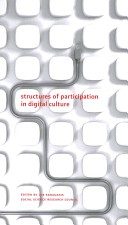Books, Brochures, and Chapters>Book Chapter: Boyd, Danah (2007), None of This is Real: Identity and Participation in Friendster, Retrieved on 2013-08-05
Folksonomies: social networking social structures Memes
05 AUG 2013
 Social Networks "Flatten" Social Structures
Social Networks "Flatten" Social Structures
Visibility has its cost; in order to make broader social networks vis-
ible, Friendster flattens those networks, collapsing relationship types and contexts into the ubiquitous “Friend.” More problematically, Friendster does not provide ways of mapping or interpreting the contextual cues and social structural boundaries that help people manage their social worlds. Physi- cal distance, to abstract from the obvious, is not just an obstacle to build- ing social relations but is also the dimen...Folksonomies: information technology social networking
Folksonomies: information technology social networking
They create a new form of interaction, where people do not know the rules; therefore, they resort to experimentation to learn how to interact.
05 AUG 2013
 Social Networks Limit Interaction to "Autistic" Levels
Social Networks Limit Interaction to "Autistic" Levels
It is hardly surprising that many participants find social interactions
on Friendster formulaic. The social structure is defined by a narrow set of rules that do little to map the complexities and nuances of relationships in other contexts. Formula-driven social worlds require everyone to engage with each other through a severely diminished mediator—what I have else- where called autistic social software, as a metaphor to signal the structured formula that autistic individuals learn to nego...Because of the limited kinds of interactions possible within a Social Network.
05 AUG 2013
 The Fakester Genocide and Revolution
The Fakester Genocide and Revolution
When Friendster eliminated the “most popular” feature in May 2003,
they also deleted both Burning Man and Ali G, each of whom had more than 10,000 friends. This was the start of a Whack-A-Mole–style purge of Fakesters, in which Fakesters and Friendster competed for dominance. Fakester farms were created and Fakester owners would duplicate their Fakesters for rein- sertion. In late June, a group of Fakesters gathered on the Friendster bul- letin board (and later in a Yahoo Group) to begi...An interesting and obscure bit of Social Networking history.
Parent Reference

Books, Brochures, and Chapters>Book: Karaganis, Joe (2007), Structures of participation in digital culture, Social Science Research, Retrieved on 2013-06-29Source Material [books.google.com]
Folksonomies: computers 



